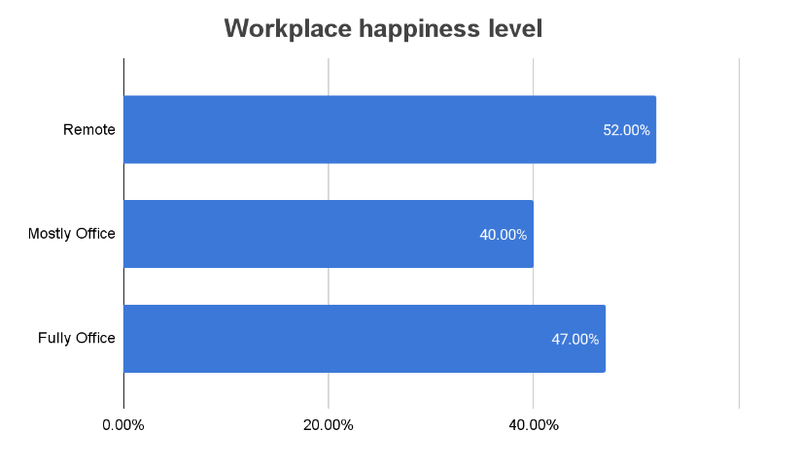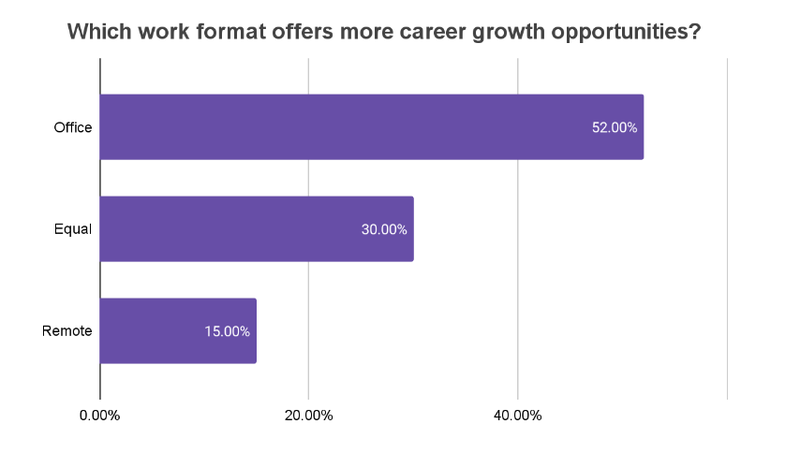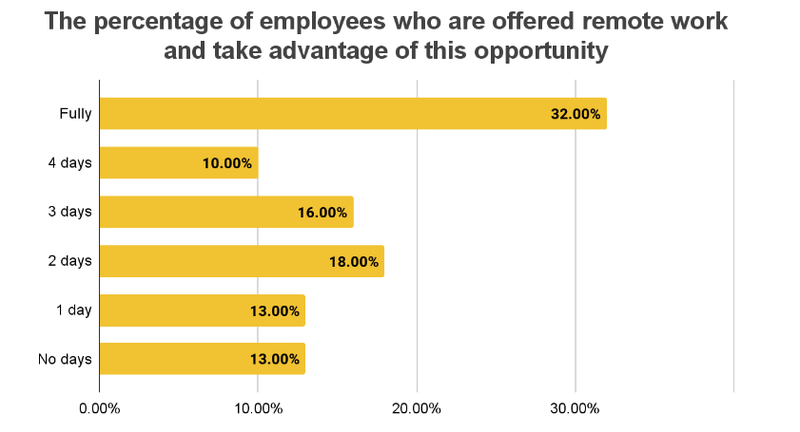Seeking a job isn’t an easy task. I’m not only talking about resumes, interviews, and other stressful things, but also about the formats of work and companies. Before applying for a position, it’s hard to evaluate what the company is like, how it treats its employees, and what kind of atmosphere exists among colleagues.
As for the formats of work, traditionally, there was only one: the "in-person" format. This involved commuting every day to the office and back home, leaving everything that happened that day at the job desk. However, as the last five years have shown, the opportunity to work remotely has become more and more desired among employees. Therefore, we now have three formats of work: in-person, remote, and hybrid (something in between). So choosing one is as difficult as it is important.
It’s great when you have options to choose from. At the same time, to make a decision, you also need to understand the matter. In this article, we’ll discuss the pros and cons of these formats, examine how companies differ depending on them, and provide some advice on how to choose one.
- For decades, people worked in-person, but now things have changed
- Both employers and employees have more flexible formats, such as remote or hybrid
- Choosing one for yourself before seeking through job openings will simplify the process
Pros and Cons of remote work
Starting with remote work, we’d like to clarify the definition. Most people think “remote = at home,” but actually, it depends on the company’s choice and your own opportunities. Some people can work from the sunny beaches of California because all they need for work is their laptop and a stable connection. Others spend most of their time on the phone, so they prefer less crowded and noisy places. So, generally speaking, remote work means you can work wherever you want, as long as it doesn't affect the quality of your work. Now let's look at the pros and cons.
(+) Saving time
For most people who prefer remote work, this is probably the biggest advantage of all. If you work from home or somewhere nearby, you can avoid huge traffic jams, public transportation, and needless stress. You also save anywhere from 1 to 3 hours a day that people spend on commuting. Sounds like a great deal.
(+) Saving money
If you don't have to commute every day, you don’t have to pay for it either. For some people, these were significant expenses. You may also save money on clothing, as at home you can just wear your favorite pajamas.
(+) Making your own schedule
It depends on the position, but many companies allow their employees to work flexible hours. This means you can work whenever you want, as long as you complete a particular amount of tasks.
(+) Overall happiness
According to the CNBC Momentive Workforce Survey, 52% of people working remotely feel completely satisfied, compared to 40% working mostly from the office and 47% working fully from the office.

(=) Productivity
It’s hard to evaluate productivity objectively. Most surveys on that matter are conducted among employees who like things as they are now. That’s why some studies say that office work is more productive, while others show the opposite result. So, it’s up to you to decide which conditions are more suitable for you. Working from home, it’s really hard to stay motivated; on the other hand, in the office, some people tend to get tired more quickly and find typical “office noise” very distracting.
(-) Clear boundaries
When you start working from home, you have to fit work into your personal environment. Some people find it challenging because they lose the boundaries between work and personal life. They no longer have strict working hours and may find themselves responding to work emails during family dinners. This leads to the next problem.
(-) Mental health
Many employees feel extreme loneliness and isolation when working from home. They rarely get out of the house and communicate with different people. The lack of understanding of where work ends and private life starts also contributes to a high level of stress and frustration.
(-) Financial matter
We’ve already mentioned that remote work often means you need to have everything for work on your own. While some companies provide their employees with necessary tools, most of them don’t. For people who don’t have a laptop or a computer and can’t afford extra expenses on work tools, remote work might not be the best option.
- Overall, people working remotely often feel more freedom in their time management and schedule
- They are able to save both time and money on commuting, lunch, and adhering to a dress code
- 52% of remote workers are quite happy with their work conditions
- For some, working outside the office can result in a poor work-life balance and a lack of real communication, which may lead to mental health problems
Pros and Cons of office work
Most of the advantages and disadvantages of office work are just the opposite of the pros and cons of remote work we’ve just discussed. So we’d like to focus on things that don’t necessarily counter working from home as well.
(+) Communication and collaboration
That’s the exact example of opposition to the "loneliness and isolation" we’ve already talked about. These are the obvious things. Here, we are talking about the opportunities you get by working from the office. These include in-person collaboration, brainstorming meetings, effective team-building, and so on.
(+) Motivation
Psychologists claim that comparing yourself with others is a bad habit. However, healthy comparison may help you acknowledge your mistakes and low points to work on them in the future. If you work with your colleagues and managers under the same roof, especially in an open-plan office, you can watch them working and gather some ideas for yourself. And they can do the same. This way, comparison becomes the point of growth and motivates everyone to do better.
(+) Career growth
According to the same CNBC survey, 52% of respondents consider office employees to have more opportunities for career growth, while 30% think office and remote workers are equal in this regard. Only 15% agree that remote workers may become more successful. These 52% of respondents may be divided into two categories. One consists of people who think that showing up in the office already gives you extra credit. The second consists of respondents who are sure that office workers are more productive overall, which helps them boost their careers.

(-) Remote pros
As we’ve already said, most office cons are simply reversed versions of remote pros, including time investment and money expenses, strict working hours, difficulties that come with crowded places, and a high level of stress as a result.
(-) Conflict situations
One thing we’d like to add is relationships. All people are built differently, meaning that misunderstandings and conflicts may occur in every workplace, which makes the office environment more complicated. When working remotely, you communicate with colleagues only online or mostly about job tasks. However, in the office, people often have informal interactions that may involve personal attitudes and conflicts, affecting work.
If you find this topic interesting and want to learn how to manage conflict situations in a healthy way, you can read this article.
- 52% of those surveyed believe that office workers have more opportunities for career growth than hybrid and remote workers
- Teamwork and collaboration are enhanced when team members work together in the same location, leading to increased motivation to excel
- Connecting with certain people can be challenging, often leading to conflicts and misunderstandings, particularly in face-to-face interactions
What about hybrid format?
For many people, the hybrid format may become the best compromise, as companies now begin to offer different options for combining office and remote work. It depends on the company what conditions to establish. The best part is that the disadvantages of both office and remote work may be minimized by the employer or the employee.
Interestingly, according to McKinsey’s American Opportunity Survey, 87% of respondents accepted or would accept the offer to work fully or partially remotely, with 57% preferring partially remote work. Here we can see an extreme need for the hybrid format.

The choice of this format will not be suitable for those who strictly prefer office work as the only effective option for themselves or for those who are absolutely sure that they do not want to be in the office for the majority of their lives. The same goes with employers. So now let’s look at another side of the coin.
- 87% of surveyed workers find the opportunity to work remotely at least some of the time useful, with 57% expressing a preference for hybrid
- The hybrid format may help mitigate the disadvantages of both office and remote work
- Hybrid work arrangements vary widely depending on the choices and needs of each company
Terms of employment
It’s essential to make sure that you know all the terms of employment. Companies have a wide choice of these terms, as long as they don’t break the law. This also includes work formats. When choosing a company, it is very important to clarify which formats the company supports and whether it provides the opportunity to change the format in the future if needed.
For some companies, an office-based lifestyle is very important. Such companies do not support remote work and view skeptically employees who ask to work from home once a week. Less extreme views include a hybrid model that involves 1 to 4 days of remote work.
At the same time, there is a fairly large number of companies that exclusively hire remote employees. Such companies do not have a physical address and do not lease office space. Of course, the list of industries that allow for this type of company is quite limited.
Regardless of the format a company chooses, they all face drawbacks associated with its choice. During interviews, pay attention to whether the company helps its employees deal with the challenges of a particular type of work and what it does to assist them with this.
- When choosing a company, it’s important to ensure that the work format they offer suits your needs
- Be aware that some companies may not have the capacity to offer office or hybrid work options
- During the interview, ask about how the company supports its employees in terms of work format
How to choose?
We have already looked at all the pros and cons, so now it's important to determine the most crucial points for yourself. Surely, something from the list resonated with you the most. Pay attention to this and base your decision on how important it is to you.
It's not a simple answer whether office work is better than remote work or vice versa. This is a decision that each employee must make for themselves. The main thing is to stick to your principles and not bend. A job built on hardships and dissatisfaction will not last long.
